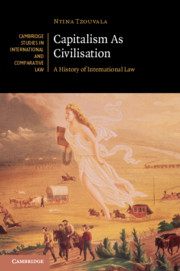Book contents
- Capitalism As Civilisation
- Cambridge Studies in International and Comparative Law: 142
- Capitalism As Civilisation
- Copyright page
- Contents
- Acknowledgements
- 1 The Standard of Civilisation in International Law
- 2 The Standard of Civilisation in the Nineteenth Century
- 3 The Institutionalisation of Civilisation in the Interwar Period
- 4 Arguing with Borrowed Concepts
- 5 From Iraq to Syria
- 6 Thinking through Contradictions on a Warming Planet
- Bibliography
- Index
- Cambridge Studies in International and Comparative Law
2 - The Standard of Civilisation in the Nineteenth Century
Between the ‘Logic of Improvement’ and the ‘Logic of Biology’
Published online by Cambridge University Press: 22 October 2020
- Capitalism As Civilisation
- Cambridge Studies in International and Comparative Law: 142
- Capitalism As Civilisation
- Copyright page
- Contents
- Acknowledgements
- 1 The Standard of Civilisation in International Law
- 2 The Standard of Civilisation in the Nineteenth Century
- 3 The Institutionalisation of Civilisation in the Interwar Period
- 4 Arguing with Borrowed Concepts
- 5 From Iraq to Syria
- 6 Thinking through Contradictions on a Warming Planet
- Bibliography
- Index
- Cambridge Studies in International and Comparative Law
Summary
Nineteenth-century international lawyers inherited a discipline in flux and inhabited a world of rapid change. As capitalism entered a period of crisis and Western imperial adventures intensified, the first generation of professional international lawyers grappled with the need to construct order. The ‘standard of civilisation’ arose as a disciplinary response to the contradictions of global capitalism. This chapter provides a detailed account of the contours of the ‘logic of biology’ and the ‘logic of improvement’. It details both the constant presence of racialised, gendered and infantilising tropes in the writings of the discipline’s ‘fathers’ and their insistence that capitalist modernity was the only path to civilisation and, by implication, to equal rights and duties under international law. The struggles over extraterritoriality demonstrate the concrete stakes of these theoretical constructions as well as the role of semi-peripheral lawyers who adopted and transformed ‘civilisation’ in order to serve the interests of their own domestic ruling classes.
Keywords
- Type
- Chapter
- Information
- Capitalism As CivilisationA History of International Law, pp. 44 - 87Publisher: Cambridge University PressPrint publication year: 2020

